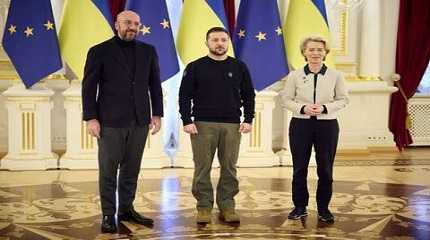
BRUSSELS, Dec 14 (Reuters) - European Union leaders made a historic decision on Thursday to open membership talks with Ukraine, bypassing objections from Hungary to give Kyiv a major political boost as its war against Russia's invasion grinds on.
Although membership would likely be many years away, the decision at a summit in Brussels takes Ukraine a step closer to its long-term strategic goal of anchoring itself in the West and liberating itself from Moscow's orbit.
The move came at a critical time for Ukraine, after its counter-offensive against Russian forces has failed to make major gains and with U.S. President Joe Biden so far unable to get a $60 billion aid package for Kyiv through the U.S. Congress.
The EU took the decision in a highly unorthodox fashion: Hungarian Prime Minister Viktor Orban, who cultivates close ties with Moscow, agreed to leave the room while his peers from the EU's 26 other members agreed the move.
"This is a victory for Ukraine. A victory for all of Europe. A victory that motivates, inspires, and strengthens," declared Ukrainian President Volodymyr Zelenskiy.
"I congratulate every Ukrainian on this day ... History is made by those who don't get tired of fighting for freedom."
German Chancellor Olaf Scholz played a key role in getting Orban to leave the room to clear the way for a decision, diplomats and officials said. Scholz said the decision was "a strong sign of support" for Ukraine.
The leaders also agreed to accession talks with another former Soviet republic, Moldova, and to grant another, Georgia, the status of membership candidate.
"It is clear that these countries belong to the European family," Scholz said on social media platform X.
The leaders said they would also start membership talks with Bosnia once it has undertaken certain political reforms.
BILLIONS AT STAKE
On Thursday evening, the EU leaders were still to decide on a proposal to grant Ukraine 50 billion euros in vital financial aid as part of a broader top-up of the bloc's long-term budget.
Orban had previously objected to that plan too
He had cited corruption and other issues in arguing Ukraine was not ready for EU talks but EU diplomats suspected he was using the issue as a bargaining chip to try to unlock EU funds frozen over concerns about the rule of law in Hungary.
On Wednesday, the European Commission - the EU's executive body - restored Hungary's access to up to 10.2 billion euros in refunds for economic projects after finding it had fulfilled conditions on the independence of its judiciary.
Orban stood by his objections to membership talks for Ukraine even after the decision was taken.
"Hungary's stance is clear, Ukraine is not prepared for us to start talks on EU membership," he said, calling the decision to start talks "irrational" and "inappropriate."
"But 26 member states were adamant that this decision must be made so Hungary decided that if 26 decide so, they should go on their own path and Hungary does not wish to participate in this bad decision," he said.
In the midst of war, geographically bigger than any EU member and with a population of 44 million, Ukraine presents some unique challenges for admission to the 27-member bloc.
But membership talks will likely take years and will not start immediately.
First, the EU will have to agree to a negotiating framework for the talks - which will require another unanimous decision. The leaders said they would take this step once Ukraine meets outstanding requirements on democracy and the rule of law.
Many EU leaders had warned that not agreeing to start negotiations would have been seen as a victory for Russian President Vladimir Putin.
Portuguese Prime Minister Antonio Costa said Orban had not asked for anything in return for letting the decision be taken.
"He realised that we were in a situation where there were 26 who had one position and he had a different one. So he didn't want to block it and this solution was found," he said.
Belgian Prime Minister Alexander De Croo was more blunt, suggesting it was time for Orban to pipe down.
"If you are part of the decision, you agree with the decision, or afterwards you just have to keep your mouth shut," he said.




